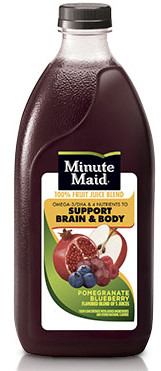When it comes to pomegranates, it's not enough to be legal
"Pom" is an evocative word. For many Australians, it is the denigratory epithet of choice when referring to the British. For others, it's half of the expression "pom-pom", so eloquently described in its Wikipedia entry [why would anyone bother to create a Wikipedia entry for "pom-pom"? Merpel would love to know] as "a loose, fluffy, decorative ball or tuft of fibrous material". Some folk think of Pomeranian dogs -- but for US litigators the word has acquired a further significance. Guest blogger Rebecca Gulbul explains:
More reports on this dispute here, here and here
More wonderful poms here and here
How to make a pom-pom here
Pom cocktails here and here
The US Supreme Court has delivered judgment in an action that brought POM Wonderful face to face with the Coca Cola Company. The court unanimously agreed (8-0) that POM was entitled to bring a lawsuit against Coca Cola for putting a misleading label on their pomegranate and blueberry drink.This Kat thinks the decision is a good one, being an inveterate reader of the small print on the labels of consumer goods and having been surprised on a number of occasions by what he found (he recalls the labelling on one carton of chopped herring that revealed the principal ingredient to be apple). Merpel thinks Minute Maid must be very clever to ensure that pomegranate is the prevailing flavour of a drink that contains just 0.3% pomegranate juice, and wonders how they manage it.
POM produced various juices, usually with a pomegranate base. One of its main products is the POM Wonderful Pomegranate Blueberry Juice. Minute Maid, owned by the Coca Cola Company, also produced a range of fruit juices. In 2007, Minute Maid released its own version of POM’s pomegranate blueberry drink. The label showed the words Pomegranate and Blueberry in larger font size than the other fruit names on the label, and included a prominent image of a pomegranate at the foreground of the picture. As POM was beginning to lose its market share to Minute Maid, it decided in 2008 to sue Coca Cola for false advertising. POM alleged that Coca Cola had misled customers into believing that the product was primarily made up of pomegranate and blueberry, when in fact, it only contained 0.3% of pomegranate juice and 0.2% of blueberry juice. For the most part (99%), the drink was made up of apple and grape juice. This, POM believed, violated a key principle of the Lanham Act-- the primary trade mark federal statute in the USA-- relating to false advertising.
Coca Cola argued that they were allowed to describe the drink as they did, since their label complied with the US Food and Drug Administration (FDA) regulations. They justified having put forward the pomegranate ingredient on the label, despite its small percentage in the drink, by saying that the characterising flavour of the drink was pomegranate. Lower courts, including the US Court of Appeals for the 9th Circuit, agreed that, since Coca Cola had complied with the FDA regulations, POM could not challenge them under trade mark law. However, the Supreme Court overturned this decision. In a unanimous ruling, the justices said that POM was entitled to go ahead and bring a lawsuit against Coca Cola for their misleading advert, since 99% of the juice was made up of apples and grapes.
Justice Anthony Kennedy of the Supreme Court said that the FDA regulations do not preclude a competitor from suing for unfair competition on the basis of false or misleading claims by invoking a different law. In fact, he said, the FDA rules and trade mark law complement each other in regulating misleading labels. While he acknowledged that allowing trade mark claims to be decided by judges throughout the USA may lead to differing outcomes, he said that this conclusion was justified since that it was the way which Congress had chosen to enforce a national policy upholding fair competition.
Following the judgment, concerns have been raised as to the uncertainty of food labelling rules. Compliabce with the FDA regulations for food labelling is unlikely to be enough if the product misleads the customer as to the real amount of an ingredient inside. The "floodgates" argument was also brought up, suggesting that, as a consequence of this ruling, there will be an increase in lawsuits.
There is currently a separate case pending against POM relating to deceptive advertising. This relates to the health claims made by POM about their products, namely that their pomegranate juice could treat or prevent heart disease, prostate cancer and other illnesses. This claim was brought by The Federal Trade Commission and is currently pending at the US Court of Appeals for the D.C Circuit.
More reports on this dispute here, here and here
More wonderful poms here and here
How to make a pom-pom here
Pom cocktails here and here



